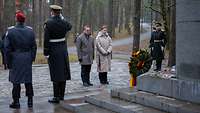
NATO eastern flank
Pistorius visits activation staff of the Brigade in Lithuania
First paragraph of the articleMinister visits activation staff in Lithuania
The deployment of an armoured brigade to Lithuania is among the most complex and ambitious projects in the history of the Bundeswehr. Some 4,800 German troops will contribute to deterring Russia on NATONorth Atlantic Treaty Organization’s eastern flank from now on. Germany’s Defence Minister travelled to Lithuania to learn more about the progress of this lighthouse project.
Shortly before Christmas, Boris Pistorius welcomed Lithuania’s new Minister of National Defence, Dovilė Šakalienė, at the Bendlerblock in Berlin. Now, Germany’s Minister of Defence has taken up his counterpart on her invitation to visit Vilnius. After a 90-minute flight on the FMoD Special Air Mission Wing’s Airbus, he landed in the Lithuanian capital on Wednesday, 11.30 am local time. Pistorius was accompanied by several members of the Defence Committee of the German Bundestag.
Deterrence is a joint task
Germany and Lithuania are security partners in NATONorth Atlantic Treaty Organization and also cooperate closely within the European Union. In addition to this, they are pursuing a joint bilateral project, which is the deployment of a 5,000-strong German armoured brigade in Lithuania.
The Baltic state with its three million inhabitants is situated right between the Russian exclave of Kaliningrad and Belarus, which is an ally of Russia. Should Russia attack Europe, Lithuania would become a target. This is why Germany is supporting its Ally's deterrence efforts: as a part of the Multinational Battlegroup Lithuania since 2017, and, in future, with the permanently deployed Brigade in Lithuania.
This deployment is a lighthouse project of the German Zeitenwende in security policy, which began after Russia’s attack on Ukraine. While the activation ceremony is scheduled for summer, 500 Brigade troops will be serving in Lithuania by the end of the year. Subsequently, more and more troops are to be deployed in increments until the target strength of 4,800 military and 200 civilian personnel has been reached.

Lithuania’s security is our security.Minister of Defence Boris Pistorius in Vilnius, 22 January 2025
Following their arrival in Vilnius, the delegation from Germany proceeded to the Presidential Palace, where Pistorius was awarded the Grand Cross of the Order of Merit of the Republic of Lithuania by President Gitanas Nausėda. The subsequent working-level meeting with representatives of Lithuania’s government focused primarily on the deployment project: What progress had been made since the last meeting; what challenges were still waiting to be tackled? After the meeting, the Ministers addressed the press.
Pistorius said that they were working towards the same goal, which was to ensure the security of NATONorth Atlantic Treaty Organization’s eastern flank. The Minister went on to say that the deployment of the Brigade to Lithuania was progressing consistently and as scheduled. He then emphasised the visibility of the Bundeswehr and its resulting contribution to deterrence. The Minister also announced that the close cooperation between the two countries would be further consolidated in the future.
His colleague, Minister Šakalienė, added that the Brigade’s deployment was vital for Lithuania and a sign of both nations’ resolve. The Minister of National Defence said that four of five Lithuanian citizens were convinced that the permanent presence of NATONorth Atlantic Treaty Organization Allies would strengthen Lithuania’s security and added that the German Brigade was Lithuania’s number one priority.
Remembering the victims of the Holocaust
After focusing on their countries’ future, the Ministers turned their attention to the past: In World War II, Germany committed a massacre in the Paneriai forest near Vilnius, murdering 100,000 people, some 70,000 of which were Jewish. Pistorius and Šakalienė laid a wreath at the Holocaust memorial erected at this site to honour the dead. The ceremony was attended by servicemen and women of both countries.

Defence Minister Pistorius and his Lithuanian counterpart Dovilė Šakalienė laying a wreath at the Holocaust memorial in Paneriai forest. 100,000 people were murdered here in World War II.
Later, the German delegation went to visit the barracks of the Lithuanian Duke Vaidotas armoured brigade in Rokantiškės. Just like another site in Nemenčinė, these facilities, which only opened last year, will be used temporarily by the Brigade in Lithuania until the Bundeswehr accommodation has been completed.
Brigadier General Christoph Huber, Commander of the Activation Staff, gave his guests a tour of the infrastructure in Rokantiškės. Afterwards, Pistorius met servicewomen and men from the activation staff in Vilnius in order to get a better impression of morale among the troops. The Minister called them the spearhead force of the Zeitenwende in security policy as well as the flagship of Germany.
On Wednesday evening, Pistorius travelled on to Rzeszów in Poland, where German air defence forces are stationed to protect a logistics hub of the international alliance that supports Ukraine as part of NATONorth Atlantic Treaty Organization’s Integrated Air Defence. 31 of 32 NATONorth Atlantic Treaty Organization members have joined NSATU (NATONorth Atlantic Treaty Organization Security Assistance and Training for Ukraine), a command created last year. Australia and New Zealand are participating as well. Through NSATU, Ukraine will receive assistance amounting to at least 40 billion euros annually in the future.
Share content on